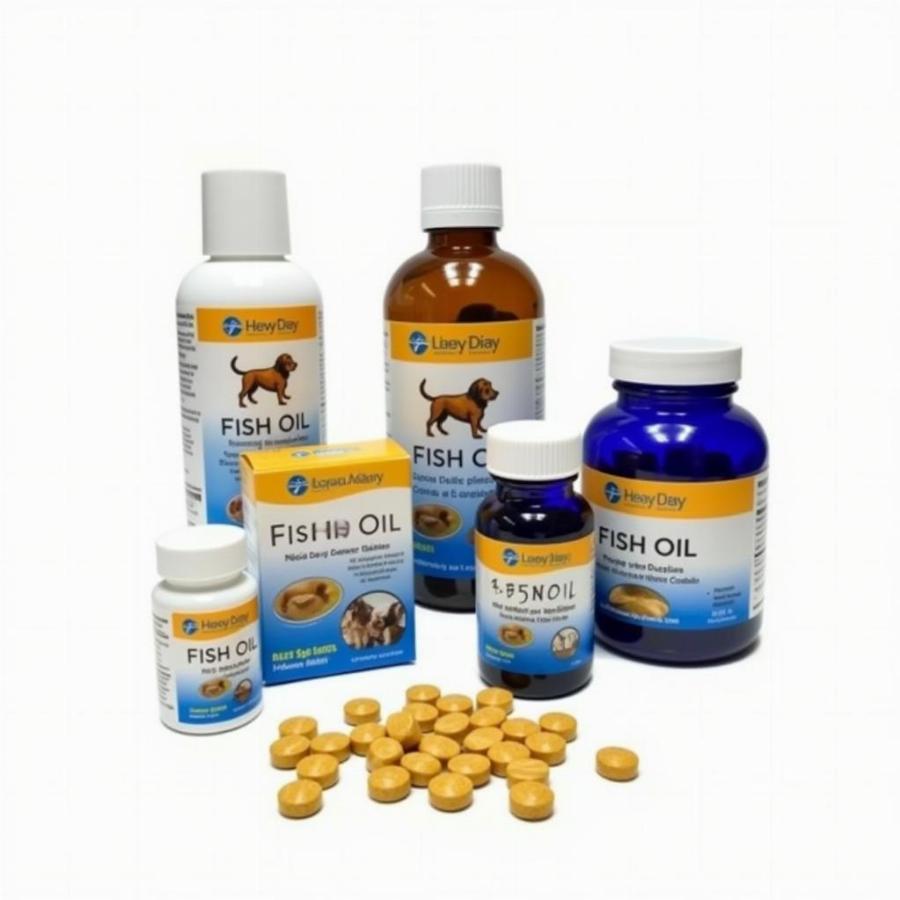Fish oil is a popular supplement for dogs, offering a wealth of potential benefits for their overall health and well-being. From shiny coats to improved joint health, understanding the uses and advantages of fish oil can help you make informed decisions about your furry friend’s nutritional needs. This guide will delve into everything you need to know about fish oil for dogs, covering its benefits, dosage, potential side effects, and how to choose the right product.
Understanding the Benefits of Fish Oil for Dogs
Fish oil is rich in omega-3 fatty acids, specifically EPA (eicosapentaenoic acid) and DHA (docosahexaenoic acid), which are essential for a dog’s health. These fatty acids play a crucial role in numerous bodily functions, contributing to everything from healthy skin and coat to supporting cognitive function.
- Skin and Coat Health: Omega-3s can help alleviate dry, itchy skin and promote a glossy coat. They work by reducing inflammation and supporting healthy cell membrane function.
- Joint Support: For dogs suffering from arthritis or other joint issues, fish oil can help reduce inflammation and improve mobility.
- Heart Health: Omega-3s can support cardiovascular health by reducing triglyceride levels and blood pressure.
- Cognitive Function: DHA is particularly important for brain development in puppies and can support cognitive function in older dogs.
- Immune System Support: Omega-3s can boost the immune system, helping your dog fight off infections and diseases.
- Allergy Relief: Fish oil may help reduce the severity of allergic reactions in some dogs.
Choosing the Right Fish Oil Supplement for Your Dog
Not all fish oil supplements are created equal. Look for products made from high-quality fish sources, such as salmon or anchovies, and that are purified to remove harmful contaminants like mercury.
- Look for EPA and DHA Content: Check the label for the specific amounts of EPA and DHA. Higher concentrations are generally more effective.
- Choose the Right Form: Fish oil comes in liquid, capsule, and chewable forms. Choose the form that is easiest to administer to your dog.
- Consider Purity and Quality: Opt for supplements that have been tested for purity and quality by a third-party organization.
 Các Loại Dầu Cá Cho Chó Cảnh
Các Loại Dầu Cá Cho Chó Cảnh
Dosage and Administration of Fish Oil for Dogs
It’s important to consult with your veterinarian to determine the appropriate dosage of fish oil for your dog. The dosage will depend on your dog’s size, age, and health condition.
- Start Slowly: Begin with a low dose and gradually increase it as needed.
- Mix with Food: Most dogs readily accept fish oil mixed with their food.
- Monitor for Side Effects: While fish oil is generally safe, some dogs may experience mild side effects such as fishy breath or upset stomach.
What is the recommended dosage of fish oil for my dog?
The recommended dosage will vary depending on your dog’s size and health condition. Consult your veterinarian for personalized guidance.
Can I give my dog too much fish oil?
Yes, excessive fish oil can lead to potential side effects. Always follow your veterinarian’s recommended dosage.
What are the signs of fish oil overdose in dogs?
Signs of fish oil overdose may include vomiting, diarrhea, lethargy, and loss of appetite.
Fish Oil and Other Supplements: dog fish oil supplement
While fish oil can be a valuable addition to your dog’s diet, it’s essential to consider other supplements they may be taking. Certain supplements can interact with fish oil, so it’s crucial to discuss your dog’s supplement regimen with your veterinarian.
Conclusion
Fish oil can offer numerous health benefits for dogs, from promoting healthy skin and coat to supporting joint health and cognitive function. fish liver oil for dogs By choosing a high-quality fish oil supplement and following your veterinarian’s recommended dosage, you can help your furry friend thrive. Remember to always consult with your veterinarian before starting any new supplement regimen.
FAQ
- What are the main benefits of fish oil for dogs? Fish oil is rich in omega-3 fatty acids, which support skin and coat health, joint function, cognitive function, and the immune system.
- How do I choose a good fish oil supplement? Look for products with high levels of EPA and DHA, made from pure fish sources, and tested for quality.
- What are the potential side effects of fish oil? Some dogs may experience fishy breath, upset stomach, or diarrhea.
- How much fish oil should I give my dog? Consult your veterinarian for the appropriate dosage based on your dog’s individual needs.
- Can I give my dog fish oil capsules meant for humans? It’s best to use fish oil supplements specifically formulated for dogs. alaska salmon fish oil for dogs
- Can puppies take fish oil? Yes, fish oil can be beneficial for puppies’ development, particularly for brain health. Consult your veterinarian for the appropriate dosage. dogs and omega 3 fish oil
- Are there any alternatives to fish oil for dogs? Some alternatives include krill oil, flaxseed oil, and algae oil, but they may not offer the same benefits as fish oil. fish oil pills for dogs
Beaut Dogs is your trusted source for all things related to dog care. We provide comprehensive information on dog breeds, health, nutrition, training, and more. When you need expert advice, contact us via Email at [email protected]. Beaut Dogs is here to help you provide the best care for your canine companion.